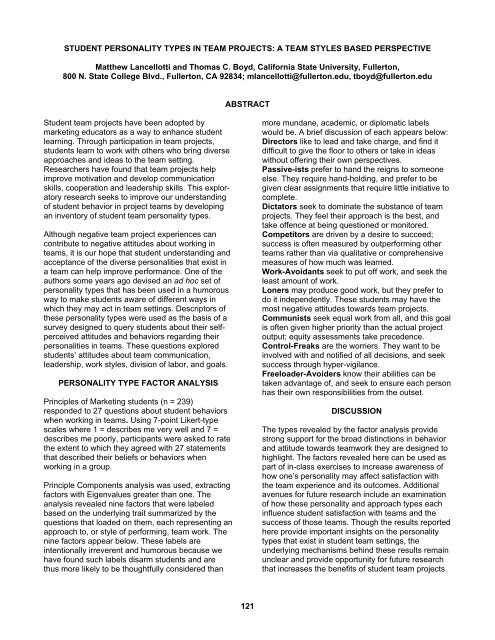2008 - Marketing Educators' Association
2008 - Marketing Educators' Association
2008 - Marketing Educators' Association
Create successful ePaper yourself
Turn your PDF publications into a flip-book with our unique Google optimized e-Paper software.
STUDENT PERSONALITY TYPES IN TEAM PROJECTS: A TEAM STYLES BASED PERSPECTIVE<br />
Matthew Lancellotti and Thomas C. Boyd, California State University, Fullerton,<br />
800 N. State College Blvd., Fullerton, CA 92834; mlancellotti@fullerton.edu, tboyd@fullerton.edu<br />
Student team projects have been adopted by<br />
marketing educators as a way to enhance student<br />
learning. Through participation in team projects,<br />
students learn to work with others who bring diverse<br />
approaches and ideas to the team setting.<br />
Researchers have found that team projects help<br />
improve motivation and develop communication<br />
skills, cooperation and leadership skills. This exploratory<br />
research seeks to improve our understanding<br />
of student behavior in project teams by developing<br />
an inventory of student team personality types.<br />
Although negative team project experiences can<br />
contribute to negative attitudes about working in<br />
teams, it is our hope that student understanding and<br />
acceptance of the diverse personalities that exist in<br />
a team can help improve performance. One of the<br />
authors some years ago devised an ad hoc set of<br />
personality types that has been used in a humorous<br />
way to make students aware of different ways in<br />
which they may act in team settings. Descriptors of<br />
these personality types were used as the basis of a<br />
survey designed to query students about their selfperceived<br />
attitudes and behaviors regarding their<br />
personalities in teams. These questions explored<br />
students’ attitudes about team communication,<br />
leadership, work styles, division of labor, and goals.<br />
PERSONALITY TYPE FACTOR ANALYSIS<br />
Principles of <strong>Marketing</strong> students (n = 239)<br />
responded to 27 questions about student behaviors<br />
when working in teams. Using 7-point Likert-type<br />
scales where 1 = describes me very well and 7 =<br />
describes me poorly, participants were asked to rate<br />
the extent to which they agreed with 27 statements<br />
that described their beliefs or behaviors when<br />
working in a group.<br />
Principle Components analysis was used, extracting<br />
factors with Eigenvalues greater than one. The<br />
analysis revealed nine factors that were labeled<br />
based on the underlying trait summarized by the<br />
questions that loaded on them, each representing an<br />
approach to, or style of performing, team work. The<br />
nine factors appear below. These labels are<br />
intentionally irreverent and humorous because we<br />
have found such labels disarm students and are<br />
thus more likely to be thoughtfully considered than<br />
ABSTRACT<br />
121<br />
more mundane, academic, or diplomatic labels<br />
would be. A brief discussion of each appears below:<br />
Directors like to lead and take charge, and find it<br />
difficult to give the floor to others or take in ideas<br />
without offering their own perspectives.<br />
Passive-ists prefer to hand the reigns to someone<br />
else. They require hand-holding, and prefer to be<br />
given clear assignments that require little initiative to<br />
complete.<br />
Dictators seek to dominate the substance of team<br />
projects. They feel their approach is the best, and<br />
take offence at being questioned or monitored.<br />
Competitors are driven by a desire to succeed;<br />
success is often measured by outperforming other<br />
teams rather than via qualitative or comprehensive<br />
measures of how much was learned.<br />
Work-Avoidants seek to put off work, and seek the<br />
least amount of work.<br />
Loners may produce good work, but they prefer to<br />
do it independently. These students may have the<br />
most negative attitudes towards team projects.<br />
Communists seek equal work from all, and this goal<br />
is often given higher priority than the actual project<br />
output; equity assessments take precedence.<br />
Control-Freaks are the worriers. They want to be<br />
involved with and notified of all decisions, and seek<br />
success through hyper-vigilance.<br />
Freeloader-Avoiders know their abilities can be<br />
taken advantage of, and seek to ensure each person<br />
has their own responsibilities from the outset.<br />
DISCUSSION<br />
The types revealed by the factor analysis provide<br />
strong support for the broad distinctions in behavior<br />
and attitude towards teamwork they are designed to<br />
highlight. The factors revealed here can be used as<br />
part of in-class exercises to increase awareness of<br />
how one’s personality may affect satisfaction with<br />
the team experience and its outcomes. Additional<br />
avenues for future research include an examination<br />
of how these personality and approach types each<br />
influence student satisfaction with teams and the<br />
success of those teams. Though the results reported<br />
here provide important insights on the personality<br />
types that exist in student team settings, the<br />
underlying mechanisms behind these results remain<br />
unclear and provide opportunity for future research<br />
that increases the benefits of student team projects.


